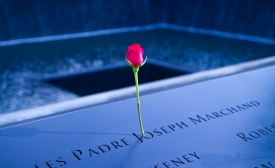public diplomacy
A report from the New America Foundation (PDF) calls for a shift in U.S. support from aid to trade and investment, engaging with the Pakistani public and institutions at all levels of governance, including easing restrictions on travel visas and intensifying support for regional peace building through improved India-Pakistan relations.
It might be the end of American hegemony in the global political and economic order, but unemployed and underpaid Americans can at least take heart at today's news. Social networking site Badoo.com conducted a poll of 30,000 people in 15 countries to name the coolest nationality. Despite a sinking economy, pathetic politics, and increasingly suspect pop culture exports -- Americans are still number 1.

Sherine B. Walton, Editor-in-Chief
Naomi Leight, Managing Editor
Tracy Bloom, Associate Editor
A website to teach schoolchildren in Britain about the events of 9/11 and "demolish conspiracy theories" surrounding the attacks has been launched by the mayor of London, Boris Johnson. He said the website would help to "provide a controlled demolition" of the conspiracy theories surrounding the attacks on the World Trade Center and the Pentagon that took place a decade ago on Sunday.
he Chinese government published a white paper on the country's development, stressing peaceful development is China's strategic choice to realize modernization, make itself strong and prosperous and make more contribution to the progress of human civilization...the white paper says that the goal is to promote development and harmony domestically and pursue cooperation and peace internationally.
As Russia tries to undo its reputation as the most unwelcoming tourist destination in Europe, Moscow is investing $3 billion to make the country more enticing to visitors and has set aide $82 million for its 200 nature preserves, some of which are unique natural wonders that have never been open to even the Russian public, much less foreign tourists.
While the Arab political system is being rebuilt after this year’s regional upheaval, Arab states should also look outward and consider how they wish to reposition themselves within the global community.
A research carried out by The News International shows that there are nearly 510 million Chinese-speaking people using the internet currently—-the second most after those who talk in English. Mandarin is the most widely spoken language on earth as over 1.372 billion humans residing on the planet express themselves in this lingo.







